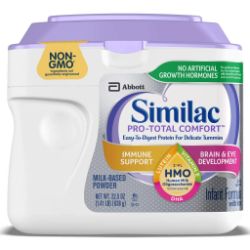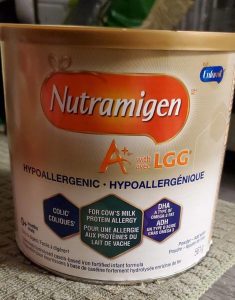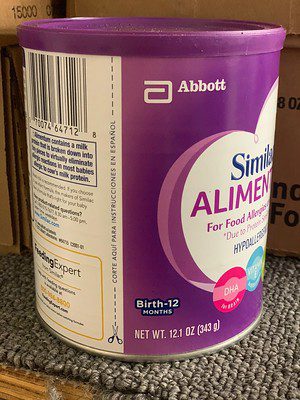Colic is a condition characterized by prolonged and intense bouts of crying in otherwise healthy babies. While there is no specific formula designed exclusively for colicky crying, some top-notch infant formula options are marketed as being gentle on a baby’s digestive system.
Is baby formula helpful? Can formula minimize the symptoms? Before delving deeper into the top-notch formula and the right formula options, let’s first understand what this colic is.

Colic is a condition that causes colicky crying and fussing in babies, often accompanied by digestive discomfort. It is a common problem in infants and can be treated by giving the baby more fluids and adjusting their diet. The most common cause of colic is an overgrowth of bacteria in the gut due to an immature digestive system. Many factors can contribute to colic, but it typically starts at around three weeks old. In this article, Family Hype will provide you with the best formula for colicky babies to make you and your child’s life more comfortable.
What Is Colic Babies?
Colic occurs when an otherwise healthy newborn begins to cry excessively and for a prolonged period of time. Every newborn experiences crying and fussiness at some point. They cry the most in the first three months of life. Colic may be diagnosed when a healthy baby screams for more than three hours a day, for more than three days a week.
Colic does not necessarily indicate that a baby is ill. Colic eventually fades away by itself after a while.
The spells always take place at the same hour of the day. The crying usually begins in the early hours of the morning. When a baby suffers from colic, he screams or cries at a high pitch, which is extremely difficult to calm down. They also display red or pale skin around their mouths, tighten their muscles, arch their backs, or clench their fists.
Colic is a mystery to medical professionals. It’s possible that the baby’s formula or the food a nursing mother consumes is causing a digestion or sensitivity problem within the infant’s digestive tract. It could also be the sound of a baby getting acquainted with the sensory experiences of the outside world. Understanding the potential impact on the digestive system and considering factors like formula composition or a nursing mother’s diet may provide insights into addressing colic-related concerns in infants.
Colic symptoms often begin between the ages of 2 and 5 weeks and subside between the ages of 3 and 4 months. Colic can affect any newborn. Because they are sucking in so much air when crying, some newborns with colic, often described as having a “gassy baby,” may experience gas as well. Nonetheless, the colic symptoms aren’t caused by the gas itself. It’s important for parents to be aware that strategies to alleviate gas discomfort, such as burping techniques or choosing anti-colic bottles, can be helpful in soothing gassy babies. Sometimes, the use of the baby swing or a baby carrier may help in relieving the symptoms.
You should be concerned if your healthy kid is weeping for over three hours a day, three times a week for at least three weeks. There’s no other way to find out whether your kid has colic symptoms but to take him to the doctor.
The Best Formula Milk For Colic Babies?
When it comes to choosing the right formula milk for your formula fed baby, organic formula options are a great choice. Organic formula typically contains fewer synthetic ingredients and fewer pesticides, making it a safer choice for your baby’s nutrition.
Some of the best organic formula options that may suit colicky babies include organic goat milk formulas. Goat milk formulas are often gentler formulas that are easier to digest than cow’s milk and can be a great option for infants who are struggling with an allergic reaction to cow’s milk protein or lactose intolerance. If your babies with sensitive stomachs experience colicky crying or digestive discomfort, considering organic and goat milk formulas over standard baby formulas may provide a gentler and more soothing option.
Preventing infant acid reflux and colicky symptoms may be easier with the use of these organic formulas:
- The use of an allergy-friendly formula
- Non-dairy infant formula
- Lactose-free formula
- Soy based formula of dietary supplements containing probiotics and prebiotics (such as Lactobacillus reuteri or L. reuteri)
Best Formula Milk For Colic Babies
Colic can be a challenging experience for both the baby and the parents. Fortunately, there are different standard formulas available in the market that can help alleviate colicky symptoms. Most formulas in this category aim to provide relief for babies experiencing digestive discomfort or colic. Here are some of the best standard infant formulas for a colicky baby:
Similac Pro-Total Comfort Formula
This formula is a non-dairy, lactose-free, and allergy-friendly option that is designed to be gentle on your baby’s tummy. Parents reported frustration, rumbling stomach, and whining were significantly reduced in children after just one day of feeding. In Similac Pro-Total Comfort, we’ve included 2′-FL HMO, a prebiotic that aids in boosting your baby’s immune system, making it our gentlest formula. If you opt to find a gentle formula for your colicky baby, consider Similac Pro-Total Comfort Formula. It is a non-dairy baby formula designed to be allergy-friendly and lactose-free, making it a great choice for a baby with colic symptoms.
This baby’s formula contains a proprietary blend of lutein, DHA, and vitamin E, all of which are found in breast milk and are critical for a baby’s eye and support brain development. This formula for colic babies does not contain palm olein oil, which is essential for healthy bones and good calcium absorption. Additionally, this formula does not contain corn syrup, which can be difficult for some babies to digest. No synthetic growth hormones have ever been used in Similac formula, making it the first premier organic baby formula brand. Similac Pro-Total Comfort Formula has no genetically modified substances.

Enfamil Nutramigen With Enflora LGG Hypoallergenic Baby Formula
The hypoallergenic formula Nutramigen LGG Infant Formulas, which contain partially hydrolyzed nonfat milk, human milk oligosaccharide, and anti-colic baby bottles, have been successfully proven to relieve colic symptoms caused by a cow’s milk protein allergy in as little as 48 hours.
Because it is a hypoallergenic formula, the Nutramigen LGG Infant formula, which does not contain cow’s milk or artificial growth hormones, helps alleviate a colicky baby caused by a cow’s milk allergy while providing the nutrition your developing baby requires to experience healthy development. Babies who have cow’s milk allergy are more likely to develop additional allergies, such as eczema or asthma. This Enfamil infant formula can help minimize the likelihood of future allergic reactions while delivering the nourishment necessary to achieve the child’s healthy growth. When preparing formula for your colicky baby, Nutramigen LGG Infant formula offers a hypoallergenic option to address cow’s milk allergies, providing both your baby’s relief and essential nutrients.

Only Organic Sensitive Dairy DHA/ARA Formula
If you have a child who is one year old or older, you can use Baby’s Only Organic® Toddler Formula. To ensure continuous organic support for development and growth after baby formula or breastfeeding, we recommend Baby’s Only Organic® Toddler Formula.
The first organic milk-based formula for children with lactose sensitivity or those who have had gastrointestinal sickness, Baby’s Only Organic® Sensitive with Organic DHA and ARA Toddler Formula, addresses the nutritional needs of colicky babies while accommodating those with lactose sensitivity or food allergies. If parents do not want their children to consume soy protein formula, this formula for colic babies provides an alternative that includes organically produced DHA and ARA sourced from organic egg yolks. This is referred to as “organic egg lecithin” in the list of ingredients on our packaging. Unlike DHA and ARA generated from algae or fungus, ours is hexane-free. The OU has certified this product as kosher.
Similac Alimentum Hypoallergenic
Regarding infant organic formula options, Similac Alimentum Infant Formula with 2′-FL HMO is the only hypoallergenic formula with this special component. As soon as your infant is administered the medication, the colic symptoms should begin to diminish within 24 hours. If you have a cow’s milk protein allergy, Similac Alimentum formula is your best bet.

Enfamil NeuroPro Gentlease Baby Formula For Colic
To soothe your baby, Enfamil NeuroPro Gentlease Formula is clinically shown to lessen fussiness and crying within 24 hours, as well as to include Omega 3 DHA in the recommended dosage.
Within 24 hours of use, Gentlease Formula mix has been clinically proven to minimize crying, gas, and spit-up. Enfamil NeuroPro Gentlease has the recommended quantity of Omega 3 DHA for brain and eye development, promoting both cognitive and visual health. It’s the most recommended out of all the best baby formula options by pediatricians, so you may get brain-building nourishment and comfort from crying, fussiness, gas, and spit-up. This formula for colic babies not only supports brain development but also incorporates components for optimal gut health. With easy-to-digest proteins and essential vitamins and minerals essential to boost the baby’s immune system, the formula suits newborns up to 12 months old.
How To Choose The Right Formula For Colic Babies
- Consult with a pediatrician to understand any underlying health conditions or dietary restrictions.
- Explore formula options specifically designed to relieve colicky symptoms, often featuring gentle ingredients and easy digestibility.
- Pay attention to potential allergens and consider hypoallergenic options if necessary.
- Conduct trials with different formulas, as infants’ responses may vary.
- Consider formulas with added components like probiotics or those that best suit sensitive tummies.
- Seek personalized guidance from healthcare professionals to ensure the best choice and ensure the infant’s well-being.
When choosing a formula for colicky babies, it’s important to consider different options such as regular cow’s milk formula, cow’s milk formula, European formula, powdered formula, liquid formulas, and organic skim milk. Another factor to consider is the use of vegetable oil in formula, which can be easier to digest for some babies. Additionally, some formula brands contain milk fat globule membrane, which is a component of breast milk that may aid in digestion and boost the immune system. It’s essential to ensure that the chosen formula includes crucial nutrients like vitamin D for your baby’s overall health and development.
However, it’s important to note that some babies may have allergies or intolerances to certain types of formula, such as those made with corn syrup solids or those with specific types of vegetable oils. In these cases, goat’s milk or non-dairy formula types may be a better option. Consulting with a pediatrician can help determine the best formula for your baby’s specific needs.
If you suspect that your baby’s colic symptoms are related to their formula, it’s important to consult with your pediatrician, especially considering your baby’s health history. Colic and gastroesophageal reflux disease symptoms can sometimes overlap or be mistaken for each other due to their similar presentations. Seeking professional guidance will help in ruling out any underlying medical conditions. They can help you determine the best course of action to address your baby’s colic symptoms and find the right infant nutrition and formula for their specific needs. A happy baby is often the result of choosing the best baby formula for colic, making a significant difference in their comfort and overall well-being.
What is your favorite formula for a colic baby? Let us know by leaving a comment. Bookmark our Family Hype page for more health tips!
Formula For Colic Babies FAQs:
Is Enfamil Gentlease Formula A Beneficial Formula For Colic Babies?
How To Beat This Condition?
Alleviating symptoms in babies involves several strategies to bring comfort and relief.
- Establish a calming routine and environment to achieve consistent soothing activities.
- Experiment with different best feeding techniques and positions, ensuring proper burping to minimize gas.
- Consider formula options designed to relieve symptoms, emphasizing gentle and easily digestible options.
- Explore soothing techniques, such as gentle rocking, swaddling, or using white noise.
- Regularly consult with a pediatrician to rule out underlying health concerns and receive best-personalized advice to manage the symptoms.
What’s The Best Formula Milk For Colic Babies?
Is It Advisable To Switch To Formula For Colic Babies?
What Is The Right Formula For Colic Babies?
Specialized colic formula, partially hydrolyzed proteins, and protein hydrolysate formulas can be good options for colicky babies. These formulas are designed to be gentle on the digestive system and can help reduce discomfort.
How Can I Relieve My Baby’s Colic Fast?
Some ways to relieve colic in babies include using a pacifier, gentle massage, swaddling, and rocking. Additionally, specialized colic formula and lactic acid probiotic culture can also help to relieve symptoms of colic.
How Long Does Colic Last For Babies?
What Can Make Colic Worse?
Several factors can exacerbate colic symptoms in babies, including:
- Certain foods consumed by breastfeeding mothers, such as dairy, caffeine, or spicy foods, might contribute to symptoms in breastfed infants.
- The type or brand of formula may impact the symptoms of formula-fed infants. Experimenting with different formula options, especially those designed for sensitive tummies, can be beneficial.
- Loud noises, bright lights, or a chaotic environment can overstimulate an infant and potentially worsen symptoms.
- Improper feeding techniques, such as allowing the infant to swallow air during feeds, can contribute to symptoms.
- High levels of stress or tension in the household can affect the infant’s well-being, potentially exacerbating symptoms.
Why Does A Baby Get Colic?
How Do I Know If It’s Colic Or Something More Serious?
What Do Pediatricians Recommend For Colic?
What Age Is Worst For Colic?
What Are The 4 Ways To Prevent Colic?
What Helps Colicky Baby Naturally?
Does Gripe Water Stop Colicky Crying?
Last Updated on May 7, 2023 by Rejie Salazar
DISCLAIMER (IMPORTANT): This information (including all text, images, audio, or other formats on FamilyHype.com) is not intended to be a substitute for informed professional advice, diagnosis, endorsement or treatment. You should not take any action or avoid taking action without consulting a qualified professional. Always seek the advice of your physician or other qualified health provider with any questions about medical conditions. Do not disregard professional medical advice or delay seeking advice or treatment because of something you have read here a FamilyHype.com.